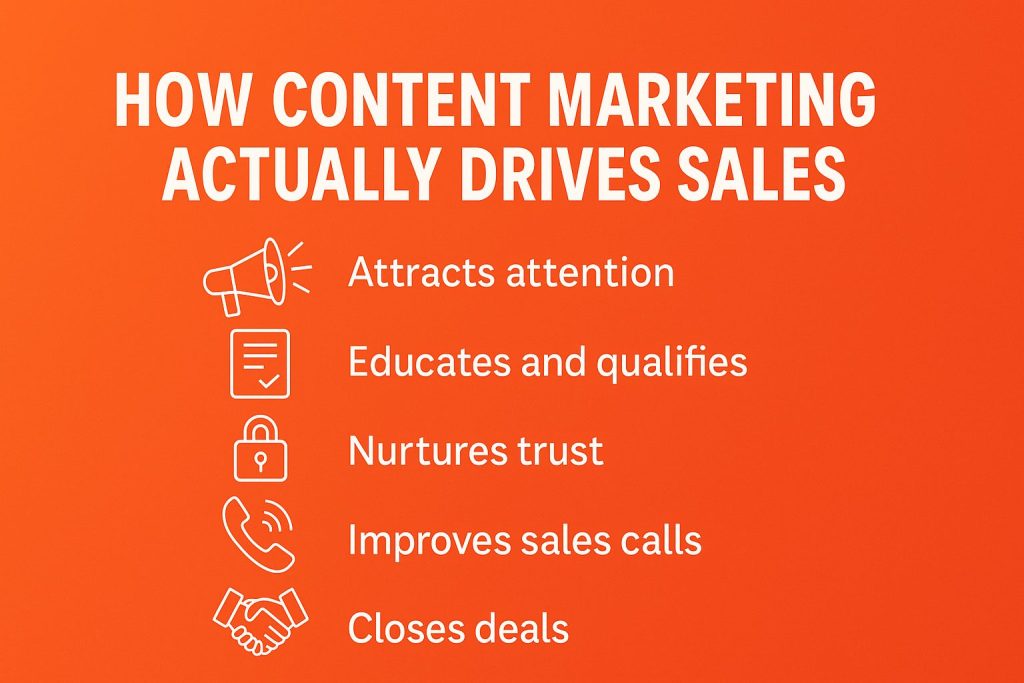When you’re selling to other businesses, you’re not just pushing products — you’re earning trust, solving problems, and helping buyers make smart decisions. That’s exactly where content marketing shines.
B2B buyers are cautious. They do research, compare options, and want real proof before committing. Content gives you a direct line to answer their questions, prove your value, and build the kind of trust that turns into revenue. Let’s break down why content marketing matters so much in B2B — and how it drives real sales.
Why Content Marketing Is Important for B2B
If you’re selling to other businesses, content marketing isn’t optional — it’s essential. In the section below, we’ll walk through the key reasons why it plays such a critical role in attracting leads, building trust, and closing deals in the B2B world.
1. Content Helps B2B Buyers Make Informed Decisions
Before any B2B purchase, decision-makers want to feel confident. They’re looking for:
- Honest information
- Product comparisons
- Real-world case studies
- Clear explanations
Well-written blog posts, videos, white papers, and webinars give buyers the knowledge they need — and position your brand as a trusted resource, not a sales pitch.
When your content answers their questions before a sales call ever happens, you’ve already done half the work.
2. It Builds Trust and Brand Credibility
B2B buyers don’t buy from companies they don’t trust. Content helps you earn that trust by:
- Showing your expertise
- Sharing real solutions (not buzzwords)
- Publishing useful insights, not just company updates
When you consistently publish helpful content, you stay top of mind. Over time, you become “the one that knows their stuff” — and that’s exactly who people want to work with.
3. Content Drives Long-Term, Organic Traffic
Traditional ads stop working the moment you stop paying. Content, on the other hand, keeps working.
SEO-friendly blog posts, how-to guides, and evergreen resources bring in search traffic for months — even years — after publishing. The more quality content you produce, the more chances you have to show up in Google for keywords your buyers are searching.
That’s free visibility, high-intent traffic, and warm leads — without constantly spending on ads.
4. Content Marketing Supports the Entire Sales Funnel
Different buyers are in different stages of their journey. Some just discovered their problem. Others are comparing solutions. A few are almost ready to buy.
Content meets each one where they are:
- Top of Funnel (ToFu): Blogs, infographics, social posts
- Middle of Funnel (MoFu): Case studies, comparison guides, videos
- Bottom of Funnel (BoFu): Testimonials, free trials, pricing pages
Creating the right content at the right stage speeds up the sales process and reduces friction — making it easier to close the deal.
5. It Generates Higher-Quality Leads
Content helps filter out unqualified leads. Instead of wasting time on people who aren’t ready, you attract buyers who already understand what you offer.
How? Because good content:
- Speaks directly to your ideal customers
- Address their pain points
- Shows them how you solve real problems
When someone downloads your white paper or subscribes to your newsletter, they’ve already shown interest. Now, your sales team can follow up with leads that are informed and engaged, not cold and confused.
6. Content Makes Your Sales Team’s Job Easier
Content isn’t just for marketing — it’s a tool your sales team can use too.
- Product explainer videos
- Customer case studies
- Objection-handling blog posts
- Pricing comparisons
These resources help sales reps answer common questions, overcome objections, and close faster, without repeating themselves on every call.
7. It Improves Customer Retention and Loyalty
Content doesn’t stop once you land the deal.
Helpful onboarding guides, FAQs, how-to videos, and educational emails keep your customers informed, confident, and happy. That builds loyalty — and loyal customers renew, refer others, and stay longer.
Great content = fewer support tickets + more satisfied customers.
8. It’s Cost-Effective (With Strong ROI)
Paid ads cost more every year. Content gives you a better return over time.
Once you write a high-performing blog or create a killer case study, you can:
- Use it in email campaigns
- Share it on social
- Include it in sales decks
- Repurpose it into videos or infographics
The more you reuse content across channels, the more value you get from it, without creating something new every time.
9. It Helps You Stand Out From the Competition
Not every B2B company has a smart content strategy. Many are still stuck in outdated sales-first approaches.
If you’re the brand educating your market, answering questions publicly, and publishing valuable content, you’ll be the one buyers trust. And when it’s time to choose? They’ll remember you.
10. Content Marketing Builds Relationships at Scale
You can’t have one-on-one conversations with every lead. But your content can.
It speaks to hundreds, thousands — sometimes millions — of people all at once. And when done right, it still feels personal. That’s the power of thoughtful content: it builds relationships without burning out your team.
Bonus: How Content Marketing Actually Drives Sales
Let’s tie it all together.

Here’s how content directly drives B2B sales:
- Attracts attention – SEO and B2B social content bring in potential buyers.
- Educates and qualifies – Smart content shows who your product is for (and not for).
- Nurtures trust – Case studies and insights make you the safe, proven option.
- Improves sales calls – Reps spend less time educating, more time closing.
- Closes deals – Confident buyers make faster, bigger purchases.
- Reduces churn – Happy customers who understand your product stick around.
In short: content = more sales, fewer headaches, and faster growth.
Which Type of Content Is Most Effective for B2B Marketing?
Not all content works the same way. The best-performing formats usually depend on your audience and where they are in the buying process. But in general, these content types deliver the highest impact in B2B:
- Blog posts – Great for SEO, educating your audience, and driving organic traffic.
- Case studies – Help prove your solution works with real-world results and build buyer confidence.
- White papers – Useful for technical buyers who need detailed insights before making a decision.
- Videos – Ideal for showing how your product works and simplifying complex ideas.
- Webinars – Attract engaged, high-intent leads and provide a two-way learning opportunity.
Conclusion
Understanding why content marketing is important for B2B comes down to this: it builds trust, attracts qualified leads, and supports sales from the first touchpoint to post-purchase. In a space where decisions are slow and stakes are high, valuable content gives buyers the clarity and confidence they need to move forward with you.
FAQs
1. Does content marketing work for B2B?
Yes, and it’s one of the most effective strategies in B2B. It helps you build trust, answer buyer questions, attract organic traffic, and close more deals without relying solely on sales reps or ads.
2. What is the most important thing for B2B marketing?
Trust. B2B buyers need to believe that your product solves their problem and that your brand is credible. Content is how you earn that trust — by proving expertise, showing results, and being helpful before they ever speak to sales.
3. What is the importance of content marketing?
Content marketing lets you attract, educate, and convert buyers without being pushy. It supports every stage of the customer journey and keeps working long after you hit publish, driving leads, sales, and customer loyalty.
4. Why is content marketing important for B2B growth?
B2B buyers rely on research and relationships before purchasing. Content marketing builds those relationships by educating, building credibility, and showing clear value, helping your brand stay top of mind through every stage of the buyer’s journey.
5. How does content marketing drive sales in B2B?
It attracts high-intent buyers through SEO, educates them with useful insights, builds trust with proof like case studies, and supports sales reps with ready-made resources. When prospects are confident and informed, sales happen faster and with less friction.

